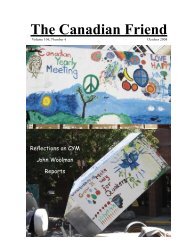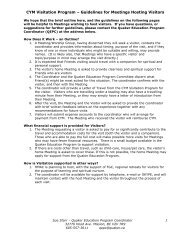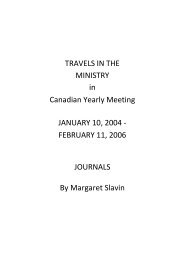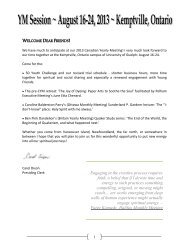Download pdf - Canadian Yearly Meeting
Download pdf - Canadian Yearly Meeting
Download pdf - Canadian Yearly Meeting
Create successful ePaper yourself
Turn your PDF publications into a flip-book with our unique Google optimized e-Paper software.
The firstthing peopleof other faithsare likely toask me whenthey find out Iam a Quaker,is:“What do Quakers believe?” My answer is “thesame thing you believe”. All religious traditions teachthe same lesson: “Love your neighbor as yourself forremember, your neighbor is God” (Mark 12.29-31).Matthew adds, especially if you dislike your neighbor,do the exceptional, make them your friend (Matthew5.43-48; John 15.15).Why do people always ask this question about“belief”? It is because Western religion over time turneditself to “the letter” over “Spirit” – thus dismissingteachings of the earliest Christians (2 Corinthians 3.4-9)? It is easier to keep people in line! Churches areoften about keeping “the faithful” together once theyget going. This likely keeps us distracted from the truereligious purpose, to love our neighbour as ourself. Itis hard work!People primarily associate “belief” with religion,but belief is a core human faculty. This is why allreligious beliefs converge into one truth, the interfaithand multi–faith principle: there is that of God ineveryone. In her book The Great Transformation,Karen Armstrong shows that all of the world’s religiousfaiths, as we know them today, formed all at once,everywhere, in response to ethical crises. Though shedoesn’t specifically say so, human over-population wasthe principle ecological factor that instigated a cycle ofviolence for the first time in history. William L. Ury’sThe Third Side, Why We Fight and How to Stop clinchesthe argument with archeological evidence. First camehitherto unheard-of violence, then the great faithshelped humanity find its way back to the garden ofEden safely. The original multi- and interfaith message:We are peace churches! There has to be a better way!It is ironic that the words “peace church” today areassociated only with a few, mostly the Anabaptists andthe Quakers.A True Christian DivinityMulti-faith and Inter-faith William H. MuellerLet’s change that Friends! The evidence is that allreligious traditions at heart have the same message:Handle God’s creation and His creatures with care aswe have been instructed to do – in the Judeo-Christianversion – by the everlasting covenant (Genesis 9.8-17), thus effectively bringing God’s kingdom on earthas in heaven (Matthew 6.10).The Quaker core belief of “that of God ineveryone”, leads to the testimonies of our interfaithand multi–faith, faith: Simplicity: we live in a waythat allows others to also live and fulfill their Goddirecteddestiny. Peace: we work to end the sufferingof war and violence, for it gets us nowhere. Integrity:we live being honest in our dealings with others; afterall, they are us. Community: we work to build a worldcommunity where everyone is one with the Spirit, nomatter their system of belief or unbelief. Equality: asall of us have God in us, we are created equal in God’sview and we treat others accordingly. Stewardship:“God saw all that He had made and found it verygood” are the words that end the Hebrew story of theevolution of the universe and all living things (Genesis1.1-31). Friends honor God’s words by respecting andcaring for all the creation, our earth, the plants andour fellow creatures, thus fulfilling God’s intentionthat the creation and its life rhythms shall not cease(Genesis 8.22).Queries:1) Are my beliefs useful in helping me be a betterperson, and thus a healer, like Jesus, of the tragediesthat are playing out in the world around me?2) What is my idea of the essence of religiouspurpose? Is it consistent with Friends’ belief inthe Inward Light and the testimonies that derivetherefrom?3) Do I apply the testimonies in the life of my<strong>Meeting</strong>, seeking unity irrespective of the source?4) What can I do today to put the belief of that ofGod in everyone into practise?William H. MuellerOttawa Monthly <strong>Meeting</strong>[Author’s Note: Quaker theologian Robert Barclay’s 1676defense of Quakers, is entitled: An Apology for the TrueChristian Divinity, Barclay’s Apology in Modern English,D. Freiday, ed., The Barclay Press, fourth printing, 1991.]24May 2013 - The <strong>Canadian</strong> Friend








